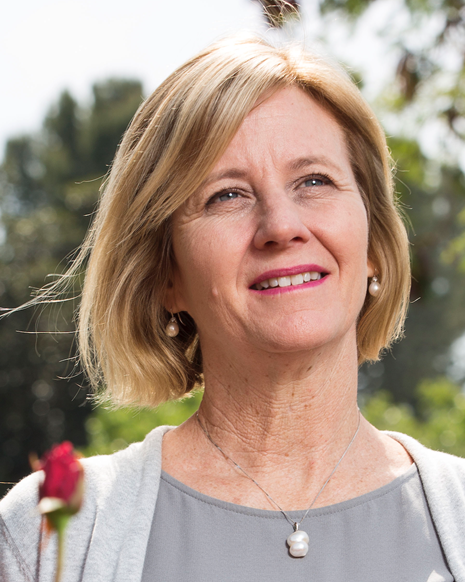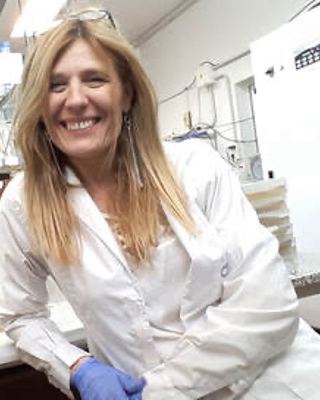
Julia Bailey-Serres
Director, Center for Plant Cell Biology (CEPCEB) | Director, NSF Plants3D NRT | Institute of Integrative Genome Biology | UC MacArthur Foundation Chair | Distinguished Professor of Genetics | Bailey-Serres Group & Plasticity Project
Julia Bailey-Serres is a distinguished professor of genetics and MacArthur Foundation chair at the University of California, Riverside. A California native, she received a PhD in botany from the University of Edinburgh and began to research hypoxia and flooding biology of plants as postdoc at UC Berkeley. Bailey-Serres studies mechanisms that safeguard yields of rice and other crops in unpredictable environments. Her group dissected roles of the SUBMERGENCE 1A gene of rice in providing survival of complete submergence, which has a stabilizing effect on yield in flood-prone regions of Asia. Her group’s research has clarified how plants sense and respond to hypoxia and the resultant energy crisis. She pioneered technologies to uncover gene activity and regulatory networks in specific cells - from chromatin to mRNA translation. Current research in her group seeks to recognize and reinforce root traits that are beneficial in both waterlogged and dry soils, focusing on gene regulatory networks in specific cells that control developmental plasticity. The work also considers the interaction between crops and beneficial microbes in the context of water extremes. As director of UC Riverside’s Center for Plant Cell Biology and the Plants3D NSF-NRT program, she cultivates undergraduate research experiences and graduate student entrepreneurship. Bailey-Serres is a member of the US National Academy of Sciences.
CONTACT: Botany and Plant Sciences, 4119 Genomics Building, University of California, Riverside, CA 92521
951-827-3738
serres@ucr.edu

Ganesh Kishore
Co-founder and Managing Partner at Spruce Capital Partners
Kishore is a co-founder and Co-Managing Partner at Spruce Capital Partners and MLS Capital Fund II. He has a distinguished track record of accomplishments in biotechnology research, development and business. After receiving Ph.D. in biochemistry from the Indian Institute of Science, Dr. Kishore did postdoctoral research in chemistry and biology at the University of Texas at Austin.
He then joined Monsanto, where he made major contributions to the discovery and development of Roundup Ready technology and manufacturing process for biochemical synthesis of the nonnutritive sweetener, Aspartame. During his tenure at Monsanto, he was named a Distinguished Science Fellow and won the prestigious Queeny Award. Before moving to DuPont, he served as the President of Monsanto’s Nutrition & Consumer Sector. He joined DuPont as the Chief Technology Officer of Agriculture & Nutrition. He retired from DuPont as Chief Biotechnology Officer to join Malaysian Life Science Capital Fund, as CEO and later co-founded Spruce Capital Partners. He is an entrepreneur who has founded or Co-founded several life science companies.
He serves on the board of several companies, academic institutions, and the advisory board of Scientific American. He’s a recipient of Bio’s Legacy Award, ASPB’s Innovation Award among other recognitions.
CONTACT: kishore@sprucecp.com and https://www.sprucecp.com/kish

María Eugenia Zanetti
Professor of Molecular Biology and Biotechnology, Universidad Nacional de La Plata, Buenos Aires, Argentina
María Eugenia Zanetti obtained her PhD at the National University of Mar del Plata (Argentina) in 2002. Afterward, she joined the laboratory of Julia Bailey-Serres at the University of California, Riverside, as a postdoctoral researcher, where she conducted seminal research on the affinity purification of “translatomes” from specific cell types in plants. María Eugenia is currently a professor and researcher at the National University of La Plata and CONICET (Argentina). Her main interest is to understand the molecular mechanisms underlying the root nodule symbiosis established between legume plants and nitrogen fixing rhizobium bacteria. Her research is focused on the characterization of transcriptional gene regulatory networks governed by the NF-Y and GRAS class of transcription factors during root nodule symbiosis. In addition, she is interested in understanding how post-transcriptional events, including both translational control and decay of mRNAs, as well as long non-coding RNAs and small RNA mediated effects, contribute to the regulation of gene expression during the development of two types of lateral root organs, nitrogen fixing nodules and lateral roots.
CONTACT: Instituto de Biotecnología y Biología Molecular, Facultad de Ciencias Exactas, Universidad Nacional de La Plata, CCT La Plata CONICET, Calle 115 e/ 49 y50 C.P.1900 La Plata, Argentina
ezanetti@biol.unlp.edu.ar